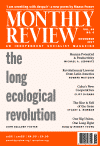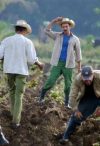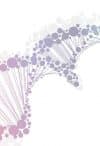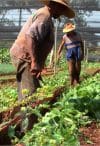Volume 69, Issue 06 (November 2017)

Over the last three decades, Monthly Review has stood out as a major source of ecosocialist analysis. This has been especially evident in recent months, with the publication by Monthly Review Press of three pathbreaking books: Kohei Saito, Karl Marx’s Ecosocialism: Capital, Nature, and the Unfinished Critique of Political Economy; Ian Angus, A Redder Shade of Green: Intersections of Science and Socialism; and Fred Magdoff and Chris Williams, Creating an Ecological Society: Toward a Revolutionary Transformation. | more…

From an ecological perspective, the Anthropocene marks the need for a more creative, constructive, and coevolutionary relation to the earth. In ecosocialist theory, this demands the reconstitution of society at large—over decades and centuries. However, given the threat to the earth as a place of human habitation this transformation requires immediate reversals in the regime of accumulation. | more…

Teachings from the Global South for Revolutionaries in the Global North
We have entered a period of history fraught with danger but also rich with revolutionary potential. It is time to move beyond our illusions that electoral politics and reforms of the capitalist state can achieve the revolutionary changes that we all know are urgently needed. As we begin to reorient our struggles there are important lessons to be learned from the recent history of the global South. | more…

Despite its grip on the scientific culture of affluent societies, the reign of the gene as the supposed “secret of life” is coming to an end. The more we learn about natural systems the clearer it becomes that genes are only one class of factors influencing phenotypic development and evolution. | more…

Marge Piercy is the author of many books of poetry, most recently Made in Detroit. | more…

President Chávez, in line with Marx, identified revolutionary praxis as the key link between human development and practice: “We have to practice socialism…and this practice will create us, ourselves, it will change us; if not we won’t make it.” From this standpoint, the material product of activity is always accompanied by a second product—the human product. Since the human product has historically been neglected in socialist theories of transition, it is worth considering its significance. | more…

Historians have long documented the ways that capitalism drew its early accumulation from the dispossession of commonly owned resources—a process that continues to this day. Building a socialist society and economy can be thought of as a reversal of this process—a reclaiming of commons. The resources that contribute to human development do so best when shared and governed democratically. This includes not only the forests and fields of the pre-capitalist past, but also education and health care systems, parks and streets, waterways, and the shared culture, knowledge, and productive resources of a society. | more…

As the global economy grows increasingly unstable, undermining job security and the dignity of work, the IWW’s pioneering tactics, and perhaps even the union itself, may again be the means by which working people of all walks secure “the good things in life” while building “a new society within the shell of the old.” | more…







